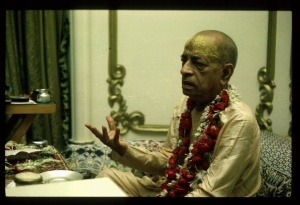BG 3.4: Difference between revisions
m (1 revision(s)) |
(Vanibot #0054 edit - transform synonyms into clickable links, which search similar occurrences) |
||
| (One intermediate revision by one other user not shown) | |||
| Line 1: | Line 1: | ||
{{ | [[Category:Bhagavad-gita As It Is (1983+) - Chapter 03|b04]] | ||
<div style="float:left">'''[[Bhagavad-gita As It Is (1983+)]] - [[BG 3 (1983+)|Chapter 3: Karma-yoga]]'''</div> | |||
<div style="float:right">[[File:Go-previous.png|link=BG 3.3]] '''[[BG 3.3]] - [[BG 3.5]]''' [[File:Go-next.png|link=BG 3.5]]</div> | |||
{{CompareVersions|BG|3.4|BG 1972|BG 1983+}} | |||
{{RandomImage}} | |||
==== TEXT 4 ==== | ==== TEXT 4 ==== | ||
<div class="devanagari"> | |||
:न कर्मणामनारम्भान्नैष्कर्म्यं पुरुषोऽश्नुते । | |||
:न च संन्यसनादेव सिद्धिं समधिगच्छति ॥४॥ | |||
</div> | |||
<div | <div class="verse"> | ||
:na karmaṇām anārambhān | |||
:naiṣkarmyaṁ puruṣo 'śnute | |||
:na ca sannyasanād eva | |||
:siddhiṁ samadhigacchati | |||
</div> | </div> | ||
==== SYNONYMS ==== | ==== SYNONYMS ==== | ||
<div class="synonyms"> | |||
<div | ''[//vanipedia.org/wiki/Special:VaniSearch?s=na&tab=syno_o&ds=1 na]'' — not; ''[//vanipedia.org/wiki/Special:VaniSearch?s=karmaṇām&tab=syno_o&ds=1 karmaṇām]'' — of prescribed duties; ''[//vanipedia.org/wiki/Special:VaniSearch?s=anārambhāt&tab=syno_o&ds=1 anārambhāt]'' — by nonperformance; ''[//vanipedia.org/wiki/Special:VaniSearch?s=naiṣkarmyam&tab=syno_o&ds=1 naiṣkarmyam]'' — freedom from reaction; ''[//vanipedia.org/wiki/Special:VaniSearch?s=puruṣaḥ&tab=syno_o&ds=1 puruṣaḥ]'' — a man; ''[//vanipedia.org/wiki/Special:VaniSearch?s=aśnute&tab=syno_o&ds=1 aśnute]'' — achieves; ''[//vanipedia.org/wiki/Special:VaniSearch?s=na&tab=syno_o&ds=1 na]'' — nor; ''[//vanipedia.org/wiki/Special:VaniSearch?s=ca&tab=syno_o&ds=1 ca]'' — also; ''[//vanipedia.org/wiki/Special:VaniSearch?s=sannyasanāt&tab=syno_o&ds=1 sannyasanāt]'' — by renunciation; ''[//vanipedia.org/wiki/Special:VaniSearch?s=eva&tab=syno_o&ds=1 eva]'' — simply; ''[//vanipedia.org/wiki/Special:VaniSearch?s=siddhim&tab=syno_o&ds=1 siddhim]'' — success; ''[//vanipedia.org/wiki/Special:VaniSearch?s=samadhigacchati&tab=syno_o&ds=1 samadhigacchati]'' — attains. | ||
</div> | </div> | ||
==== TRANSLATION ==== | ==== TRANSLATION ==== | ||
<div class="translation"> | |||
<div | |||
Not by merely abstaining from work can one achieve freedom from reaction, nor by renunciation alone can one attain perfection. | Not by merely abstaining from work can one achieve freedom from reaction, nor by renunciation alone can one attain perfection. | ||
</div> | </div> | ||
==== PURPORT ==== | |||
= | <div class="purport"> | ||
The renounced order of life can be accepted when one has been purified by the discharge of the prescribed form of duties which are laid down just to purify the hearts of materialistic men. Without purification, one cannot attain success by abruptly adopting the fourth order of life (''sannyāsa''). According to the empirical philosophers, simply by adopting ''sannyāsa'', or retiring from fruitive activities, one at once becomes as good as Nārāyaṇa. But Lord Kṛṣṇa does not approve this principle. Without purification of heart, ''sannyāsa'' is simply a disturbance to the social order. On the other hand, if someone takes to the transcendental service of the Lord, even without discharging his prescribed duties, whatever he may be able to advance in the cause is accepted by the Lord (''buddhi-yoga''). Sv-alpam apy asya dharmasya trāyate mahato bhayāt. Even a slight performance of such a principle enables one to overcome great difficulties. | |||
</div> | |||
<div | <div style="float:right; clear:both;">[[File:Go-previous.png|link=BG 3.3]] '''[[BG 3.3]] - [[BG 3.5]]''' [[File:Go-next.png|link=BG 3.5]]</div> | ||
__NOTOC__ | |||
</div> | __NOEDITSECTION__ | ||
__NOTOC__ | |||
Latest revision as of 15:27, 17 February 2024

A.C. Bhaktivedanta Swami Prabhupada
TEXT 4
- न कर्मणामनारम्भान्नैष्कर्म्यं पुरुषोऽश्नुते ।
- न च संन्यसनादेव सिद्धिं समधिगच्छति ॥४॥
- na karmaṇām anārambhān
- naiṣkarmyaṁ puruṣo 'śnute
- na ca sannyasanād eva
- siddhiṁ samadhigacchati
SYNONYMS
na — not; karmaṇām — of prescribed duties; anārambhāt — by nonperformance; naiṣkarmyam — freedom from reaction; puruṣaḥ — a man; aśnute — achieves; na — nor; ca — also; sannyasanāt — by renunciation; eva — simply; siddhim — success; samadhigacchati — attains.
TRANSLATION
Not by merely abstaining from work can one achieve freedom from reaction, nor by renunciation alone can one attain perfection.
PURPORT
The renounced order of life can be accepted when one has been purified by the discharge of the prescribed form of duties which are laid down just to purify the hearts of materialistic men. Without purification, one cannot attain success by abruptly adopting the fourth order of life (sannyāsa). According to the empirical philosophers, simply by adopting sannyāsa, or retiring from fruitive activities, one at once becomes as good as Nārāyaṇa. But Lord Kṛṣṇa does not approve this principle. Without purification of heart, sannyāsa is simply a disturbance to the social order. On the other hand, if someone takes to the transcendental service of the Lord, even without discharging his prescribed duties, whatever he may be able to advance in the cause is accepted by the Lord (buddhi-yoga). Sv-alpam apy asya dharmasya trāyate mahato bhayāt. Even a slight performance of such a principle enables one to overcome great difficulties.